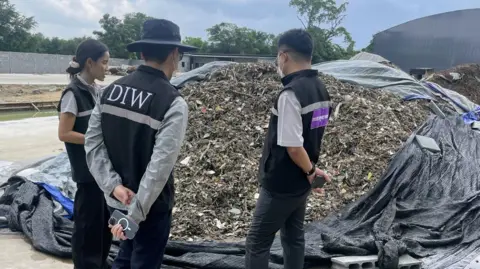Business
Why your old mobile phone may be polluting Thailand

Business reporter
 BBC
BBCAt an industrial site in eastern Thailand, Thitipas Choddaechachainun sifts through mounds of scrap metal, circuit boards and old computer keyboards in a cavernous warehouse beside a busy highway.
Like forensic scientists, she and her team of inspectors from Thailand’s industry ministry take samples of the waste and carefully bag it up to be taken away for analysis.
“A lot of this is clearly electronic waste and the company that owns this site doesn’t have a licence to process it,” she concludes. “This is a growing problem in Thailand.”
Ms Choddaechachainun is the head of a ministry task force trying to get to grips with Thailand’s e-waste problem.
Each week, she and her team head out to raid these unlicenced plants, which have popped up in recent years, mostly in rural areas, out of sight of the authorities.
But despite their efforts, the problem keeps growing.
In the past, China was a major recipient of electronic waste. Tonnes of it were shipped across the world, mostly from Western countries, to be dumped there and recycled cheaply.
But in 2018, Beijing banned imports. That forced shippers to look elsewhere and many of them alighted on Thailand and other countries in south-east Asia.
Thailand introduced its own import ban in 2020 but it has not solved the problem. The amount of electronic waste flooding into the country has increased twentyfold in the past decade, from around 3,000 tonnes a year before the Chinese ban to 60,000 now, according to environmental group Earth Thailand.
Much of it comes from the US and the European Union, where consumers update their mobile phones and computers relatively frequently, and where per-capita use of electrical goods like fridges and washing machines is high.
Even though most Western countries have laws in place to prevent the dumping of e-waste in other countries, there are ways round them. Some waste, for example, is deliberately mislabelled as “second-hand electronic goods for re-sale”, only to be smashed up, recycled and smelted once it reaches its destination.
That smelting is a dirty business, releasing mercury, lead and toxic fumes into the environment. But it is also lucrative, producing millions of dollars worth of copper, gold and other valuable metals and minerals.

“Thailand is not getting anything from these businesses,” Thai industry minister Akanat Promphan tells the BBC in Bangkok.
“There’s no value to the economy, it destroys the environment, it poses threats and endangers the livelihood of the people. That’s why I’ve formed a special task force to engage in a full-on crackdown on these businesses.”
He says the unlicenced recycling plants, many of which are Chinese-owned, have created “a sort of a garbage site – an international garbage processing facility – in Thailand”.
Once the e-waste arrives in Thailand and reaches the sites, it is fed into giant crushing machines which reduce it to a kind of gravel. It is then smelted to retrieve the valuable metal.
Promphan says most of that metal is then exported to China.
The environmental impact of this business can be devastating.
On his small plot of land in eastern Thailand, 57-year-old Seng Wongsena tells the BBC that polluted water running from a nearby smelter has blighted his cassava harvest. “The plants don’t flower like they used to,” he says, complaining that the smell from the smelter is so bad that it keeps him awake at night.
Local environmentalists say the plant is operating illegally and have urged the local authorities to shut it down.
International environmentalists are campaigning on these issues too.
“Thailand has really borne the brunt of so much,” says Jim Puckett, executive director of the Basel Action Network, an NGO that campaigns against the shipment of toxic waste. “If you import this very dirty material for recycling you were going to contaminate your soil, your people.”
Thailand’s fight against e-waste is part of a much larger global problem.

According to the United Nations, the world produces over 60 million tonnes of electrical and electronic waste each year – twice as much as 15 years ago. That figure is projected to grow by more than 30% by the end of the decade.
Less than a quarter of it is collected and recycled responsibly, the UN says. And the rate of recycling is failing to keep up with the rate at which we are generating it.
Some countries have introduced laws to make the manufacturers of electronic goods – the likes of Apple, Samsung, Dell and Hewlett Packard – more responsible for taking back gadgets once they have reached the end of their life and disposing of them responsibly.
Thailand is planning to follow suit with a law of its own.
“I’m hoping for the enactment of this new legislation as soon as possible, maybe towards the end of this year, maybe at the beginning of next year,” Promphan says. “I’m fully committed to take full actions against this illegal business and drive them out completely.”
Business
When is the Budget and what might be in it?

Jennifer Clarke & Tom EspinerBBC News
 Reuters
ReutersThe Chancellor Rachel Reeves will set out plans for the economy when she delivers the Budget on 26 November.
There have been warnings that she will have to put up taxes or cut spending if she wants to stick to her own rules on government borrowing.
Before the 2024 general election, Labour promised not to increase income tax, National Insurance or VAT for working people.
What is the Budget?
In her Budget statement, the chancellor of the exchequer will outline the government’s plans for raising or lowering taxes.
It will also include big decisions about spending on health, schools, police and other public services.
The statement is made to MPs in the House of Commons.
Alongside the Budget, additional details about the measures and costs will be published by the Treasury, the government’s economic and finance ministry.
The independent Office for Budget Responsibility (OBR), which monitors government spending, will also publish an assessment of the health of the UK economy and a forecast of what it thinks will happen in the future.
What time is the Budget and what happens afterwards?
The Budget speech usually starts at about 12:30 UK time – after Prime Minister’s Questions – and lasts about an hour.
It will be broadcast live on the BBC iPlayer and on the BBC News website.
The Leader of the Opposition, Conservative MP Kemi Badenoch, will respond to the speech in the House of Commons.
MPs debate the measures for four days, before voting on them.
If approved by MPs, tax changes can come into effect immediately. However, the government must pass a finance bill to make them permanent.
What might be in the Budget?
There has been lots of speculation that Reeves might raise taxes in the Budget.
This is because she is expected to need to raise extra money to meet her self-imposed rules for government finances, called fiscal rules.
Reeves has two main rules, which she has said are “non-negotiable”:
- Not to borrow to fund day-to-day public spending by the end of this parliament
- To get government debt falling as a share of national income by the end of this parliament
However, in its last estimate in March, the OBR said the chancellor only had £10bn headroom to meet these rules, which it called a “very small margin”.
Since then the government has U-turned on planned benefit cuts that had aimed to save billions, while the cost of government borrowing has also increased.
Tax thresholds
There has been speculation that if the government wants to raise more tax without increasing income tax, VAT or National Insurance for working people, it could extend the current freeze on income tax thresholds, which is due to end in 2028.
Freezing the thresholds means that, over time as salaries rise, more people reach an income level at which they start paying tax or qualify for higher rates. This is often referred to as a “stealth tax”.
Property taxes
There have also been reports that property taxes will be reformed.
This could include replacing stamp duty – a tax buyers pay on properties above a certain value in England and Northern Ireland – with a property tax.
Landlords could have to pay more taxes, and council tax could be replaced.
One report suggested the government was considering taxing the money people make when they sell their main home in certain circumstances – this would mean changing the capital gains tax rules.
Isa reform
In July, the chancellor ruled out any immediate reform to cash Isas (Individual Savings Accounts). There had been speculation that she wanted to reduce the annual allowance to push people into investing in shares instead, to help boost economic growth.
It is possible that reform could still happen, but other measures to encourage people towards personal investment are considered more likely.
Pension changes
There is often speculation about possible changes to pension rules ahead of the Budget, such as the tax relief available to savers and the level of the tax-free lump sum which can be withdrawn.
However, previous chancellors who have been tempted to change to the higher rate tax relief on pension contributions have not done so. Cutting the relief would save the Treasury money, but may make pension savings less attractive.
Other taxes
The TUC, the umbrella group for trade unions in the UK, has called for higher taxes on online gaming companies and on banks’ profits.
How is the UK economy doing?
The Labour government has repeatedly said that boosting the economy is a key priority.
A growing economy usually means people spend more, extra jobs are created, more tax is paid and workers get better pay rises.
The latest figures show that growth in the UK economy has slowed in recent months. The economy was flat in July, after growing by 0.4% in June.
Looking at the longer term trend, the economy grew by 0.2% in the three months to July, down from the 0.3% growth seen in the three months to June, and from the 0.6% growth seen between March and May.
Meanwhile prices in the shops are still rising faster than wanted.
Inflation – the rate at which prices rise – was 3.8% in the year to July, which is above the Bank of England’s 2% target.
Despite this, in August the Bank cut its key interest rate to 4%, taking the cost of borrowing to the lowest level for more than two years.
The Bank moves interest rates to try to keep inflation on target, and cuts are less likely when price rises are above 2%.
However, the Bank cut rates because of concerns that the jobs market is weakening, with data showing job vacancies are continuing to fall and wage growth is slowing.
Lower interest rates can make loans, credit cards and some mortgages cheaper, but can also mean worse returns for savers.
Business
AI cloud surge: Oracle’s Nvidia moment? What to know about Larry Ellison co-founded firm’s sudden rise

On Wednesday, Oracle stunned Wall Street when its shares surged 36% in a single day, the company’s biggest one-day gain since 1992. The rise followed its announcement of a series of multibillion-dollar deals in artificial intelligence (AI) cloud infrastructure, including a landmark agreement with OpenAI. The rally was so dramatic that Oracle co-founder Larry Ellison briefly overtook Elon Musk as the world’s richest person before market corrections set in.The $300 billion OpenAI deal and moreAt the centre of the surge is Oracle’s $300 billion, five-year agreement with OpenAI, one of the largest cloud computing contracts ever signed. The company will provide computing resources and infrastructure to power OpenAI’s advanced models. Oracle has also struck deals with Nvidia, SoftBank, Meta, and xAI, signalling its transformation into a core provider of AI infrastructure.Backlog signals long-term growthCEO Safra Catz revealed that Oracle’s backlog of finalised contracts has reached $455 billion, four times higher than last year, and is expected to cross $500 billion soon. This backlog offers investors confidence in sustained long-term revenue, even as quarterly results sometimes fall short of projections, as reported by ET.Competing with cloud giantsOracle’s position in AI cloud computing now puts it in direct competition with Amazon Web Services and Microsoft Azure. The company expects revenue from its cloud infrastructure business to rise 77% to $18 billion this year, and reach $144 billion within four years, according to news agency AP.The billionaire shuffleThe surge in Oracle’s stock briefly added around $100 billion to Ellison’s wealth, pushing him past Elon Musk in Bloomberg’s billionaire rankings. Musk, whose fortune is closely tied to Tesla, regained the top spot later in the day. But as AP noted, the episode highlighted how AI-driven optimism is reshaping wealth dynamics among tech leaders.Why it matters for AIOracle’s resurgence positions it as a critical enabler of global AI adoption. By providing high-performance, reliable cloud infrastructure, the company is not just fuelling chatbot development but also supporting applications in robotics, pharmaceuticals, finance, and automation. Or as Ellison himself summed it up during an earnings call: “AI changes everything.”
Business
Google’s Gemini Nano Banana AI goes viral, generating 3D Figurines

Nano Banana, the latest image-generating tool of Google’s AI chatbot Gemini, has taken the internet by storm with “gemini nano banana ai 3d figurines” trending on Google.
So, how to use Gemini Nano Banana? Users only have to give simple prompts to Google Gemini to generate realistic figurines of the image uploaded with the prompt. The generated figurine not only looks realistic but can also be put in a setting of the user’s choice.
Steps for using Gemini Nano Banana
First, the user has to open Google Gemini on his or her mobile or computer and log in with their credentials.
Then, the user has to upload an image of their choice that they want to convert into a figurine. However, the image should be clear so the AI can detect it properly. Once the image is uploaded, the user can give a prompt to generate the figurine of his or her choice.
Also Read: OpenAI vs Grok vs Gemini in world’s first AI chess tournament: Guess who won?
How to prompt Gemini Nano Banana
A suitable and easy prompt for the purpose has been shared by Google Gemini on its official X handle. “Create a 1/7 scale commercialised figurine of the characters in the picture, in a realistic style, in a real environment. The figurine is placed on a computer desk,” stated the prompt.
“The figurine has a round transparent acrylic base, with no text on the base. The content on the computer screen is a 3D modelling process of this figurine. Next to the computer screen is a toy packaging box, designed in a style reminiscent of high-quality collectable figures, printed with original artwork. The packaging features two-dimensional flat illustrations,” it added.
Also Read: Eight free AI tools to create Studio Ghibli-style images easily
Other features of Nano Banana
Apart from generating images, Nano Banana can also be used for adding or removing elements in a picture. It can be done with this simple saying: “Using the provided image, please [add/remove/modify] [element] to/from the scene. Ensure the change is [description of how the change should integrate],” reported the Hindustan Times.
Users can also combine multiple images and create a new one. All the user has to do is use this prompt: “Create a new image by combining the elements from the provided images. Take the [element from image 1] and place it with/on the [element from image 2]. The final image should be a [description of the final scene].”
-

 Business2 weeks ago
Business2 weeks agoThe Guardian view on Trump and the Fed: independence is no substitute for accountability | Editorial
-
Tools & Platforms1 month ago
Building Trust in Military AI Starts with Opening the Black Box – War on the Rocks
-

 Ethics & Policy2 months ago
Ethics & Policy2 months agoSDAIA Supports Saudi Arabia’s Leadership in Shaping Global AI Ethics, Policy, and Research – وكالة الأنباء السعودية
-

 Events & Conferences4 months ago
Events & Conferences4 months agoJourney to 1000 models: Scaling Instagram’s recommendation system
-

 Jobs & Careers2 months ago
Jobs & Careers2 months agoMumbai-based Perplexity Alternative Has 60k+ Users Without Funding
-

 Podcasts & Talks2 months ago
Podcasts & Talks2 months agoHappy 4th of July! 🎆 Made with Veo 3 in Gemini
-

 Education2 months ago
Education2 months agoMacron says UK and France have duty to tackle illegal migration ‘with humanity, solidarity and firmness’ – UK politics live | Politics
-

 Education2 months ago
Education2 months agoVEX Robotics launches AI-powered classroom robotics system
-

 Funding & Business2 months ago
Funding & Business2 months agoKayak and Expedia race to build AI travel agents that turn social posts into itineraries
-

 Podcasts & Talks2 months ago
Podcasts & Talks2 months agoOpenAI 🤝 @teamganassi


